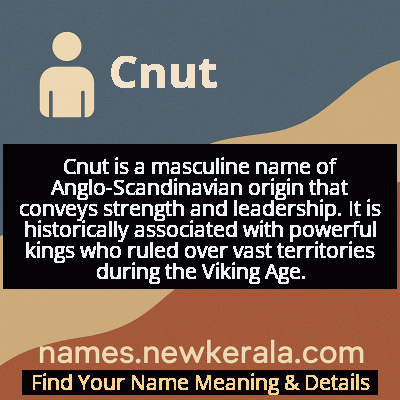Cnut Name Meaning & Details
Origin, Popularity, Numerology Analysis & Name Meaning of Cnut
Discover the origin, meaning, and cultural significance of the name CNUT. Delve into its historical roots and explore the lasting impact it has had on communities and traditions.
Name
Cnut
Gender
Male
Origin
Anglo
Lucky Number
4
Meaning of the Name - Cnut
Cnut is a masculine name of Anglo-Scandinavian origin that conveys strength and leadership. It is historically associated with powerful kings who ruled over vast territories during the Viking Age.
Cnut - Complete Numerology Analysis
Your Numerology Number
Based on Pythagorean Numerology System
Ruling Planet
Uranus (Rahu)
Positive Nature
Strong sense of order, loyal, practical, and disciplined.
Negative Traits
Stubborn, overly serious, rigid, and prone to feeling restricted.
Lucky Colours
Blue, gray.
Lucky Days
Saturday.
Lucky Stones
Blue sapphire.
Harmony Numbers
1, 7, 8.
Best Suited Professions
Managers, engineers, accountants, organizers.
What People Like About You
Dependability, discipline, practicality.
Famous People Named Cnut
Cnut the Great
King
Established the North Sea Empire spanning England, Denmark, and Norway
Cnut IV of Denmark
King and Saint
Canonized saint and last Viking king of Denmark
Cnut Lavard
Danish Prince
Canonized saint and father of King Valdemar I of Denmark
Name Variations & International Equivalents
Click on blue names to explore their detailed meanings. Gray names with will be available soon.
Cultural & Historical Significance
The name Cnut symbolizes a crucial historical transition where Viking raiders transformed into settled rulers and administrators. Cnut's court became a cultural melting pot where Anglo-Saxon, Norse, and Norman influences intermingled, laying groundwork for later medieval developments. The famous story of Cnut commanding the tides, whether historical or apocryphal, has become an enduring cultural metaphor for the limits of royal power and the importance of humility. This narrative has ensured that the name Cnut remains recognizable centuries later, representing both the ambition and the wisdom that characterized this pivotal historical figure.
Extended Personality Analysis
The name Cnut evokes personality traits of formidable leadership, strategic intelligence, and unwavering determination. Individuals bearing this name are often perceived as natural rulers who combine physical courage with intellectual acuity. They tend to be pragmatic visionaries—able to see long-term goals while managing immediate practical concerns effectively. The historical Cnut's ability to govern diverse cultures suggests that modern namesakes might possess exceptional diplomatic skills and cultural adaptability. There's an inherent strength in the name that suggests someone who can command respect through both authority and competence.
Beyond the obvious leadership qualities, the name Cnut implies a complex personality capable of both fierce determination and thoughtful reflection. The legendary tide story associated with King Cnut adds layers of symbolic meaning—suggesting humility, self-awareness, and the wisdom to recognize natural limits. This creates a personality profile that balances ambition with practicality, strength with wisdom, and authority with responsibility. The name carries an air of historical gravitas that might influence its bearers to approach life with seriousness of purpose and a sense of legacy-building, whether in professional, personal, or creative endeavors.
Modern Usage & Popularity
In contemporary naming practices, Cnut remains an exceptionally rare choice, primarily preserved within historical contexts and Scandinavian communities. The name's modern usage is almost exclusively intentional rather than trendy, chosen by parents with specific interests in medieval history, Scandinavian heritage, or seeking a name with substantial historical weight. In Denmark, the variant 'Knud' maintains modest but steady usage, often honoring family traditions rather than following naming fashions. The name's association with the famous tide story has given it cultural recognition beyond historical circles, making it a name that immediately evokes specific historical and symbolic connotations. Modern bearers of the name often find themselves explaining its pronunciation and significance, making it a choice that requires both confidence and appreciation for historical legacy.
Symbolic & Spiritual Meanings
Symbolically, Cnut represents the mastery of complex systems and the unification of contrasting elements. The name evokes the image of a bridge-builder—someone who can connect different cultures, traditions, or ideologies into a cohesive whole. It symbolizes the transformation of raw power into structured governance and the wisdom to know when to exercise authority versus when to acknowledge higher forces. The legendary tide story adds profound symbolic depth, representing the humility required of true leadership and the recognition that some forces—whether natural, social, or spiritual—transcend human control. The name carries connotations of legacy and endurance, suggesting that true power lies not in temporary conquest but in creating systems and traditions that outlast individual rulers.

